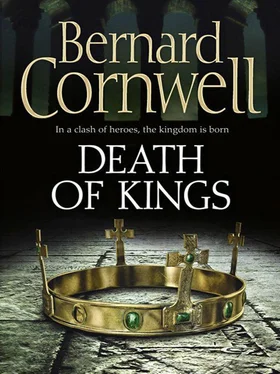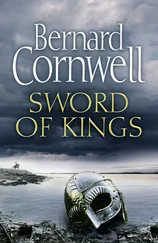‘Maybe I’ll come back,’ I said, and I thought maybe I would return to Snotengaham one day because if Alfred’s dream of uniting all the lands where the English tongue was spoken were to come true then the Danes must be driven from this and every other town between Wessex and the wild Scottish frontier.
At night, when the singing had faded from Snotengaham’s taverns and the dogs had gone quiet, the sentries who watched over the ships would come to our fires and accept our food and ale. That happened for three nights, and then, in the next dawn, my men chanted as they rolled Tyr’s Daughter down a ramp of logs and so into the Trente. She floated. It took a day to ballast her and another half-day to distribute the stones so that she floated true, just a little down at the stern. I knew she would leak, all ships leak, but by nightfall of the second day there was no evidence of water above the newly placed ballast stones. Frithof had kept his word and brought us oars, and my men rowed the ship upstream for a few miles, then turned her and brought her back. We stowed the mast on a pair of cradles, lashed the furled sail to the mast, and stacked what meagre possessions we owned beneath the small half-deck at the stern. I spent what few silver coins I had left on a barrel of ale, two of dried fish, some twice-baked bread, a flitch of bacon and a great rock-hard cheese wrapped in canvas. At dusk Frithof brought us a sea eagle’s head, carved from oak, that would fit over the prow. ‘It’s a gift,’ he told me.
‘You’re a good man,’ I said, and I meant it.
He watched as his slaves carried the carved head on board my ship. ‘May Tyr’s Daughter serve you well,’ he said, touching the hammer at his neck, ‘and may the wind never fail you and may the sea carry you safe home.’
I told the slaves to stow the head in the prow. ‘You’ve been helpful,’ I told Frithof warmly, ‘and I wish I could thank you properly.’ I offered him a silver arm ring, but he shook his head.
‘I’ve no need of it,’ he said, ‘and you might need silver in Frisia. You leave in the morning?’
‘Before midday,’ I said.
‘I’ll come and say farewell,’ he promised.
‘How long to the sea?’ I asked.
‘You’ll make it in two days,’ he said, ‘and once out of the Humbre, head a little north. Avoid the East Anglian coast.’
‘Trouble there?’
He shrugged. ‘A few ships looking for easy prey. Eohric encourages them. Just head straight out to sea and keep going.’ He cocked his head at the sky that was clear of clouds. ‘If this fine weather lasts you’ll be home in four days. Five, maybe.’
‘Any news from Ceaster?’ I asked. I was worried that Sigurd would have learned that he had been deceived and would be returning to his heartland, but Frithof had heard nothing and I assumed that Finan was still leading the jarl a dance through the hills and woods south of the old Roman fort.
There was a full moon that night, and the watchmen again came to the wharf where Tyr’s Daughter was tethered to Bright-Flyer by hemp ropes. The moon glossed the river’s swirls. We gave the watchmen ale, regaled them with songs and stories, and waited. A barn owl flew low, wings white as smoke, and I took the bird’s swift passage as a good omen.
When the night’s heart came and the dogs were silent I sent Osferth and a dozen men to a hayrick that lay halfway to the town. ‘Bring back as much hay as you can carry,’ I said.
‘Hay?’ one of the watchmen asked me.
‘Bedding,’ I explained, and told Ludda to fill the man’s ale-horn. The watchmen did not seem to notice that none of my men was drinking, or sense the apprehension among my crew. They drank, and I climbed aboard Bright-Flyer and crossed to Tyr’s Daughter , where I pulled my mail coat over my head and strapped Serpent-Breath to my waist. One by one my men came to the boat and dressed for war, while Osferth returned with great armfuls of hay, and only then did one of the four watchmen decide that our behaviour was strange.
‘What are you doing?’ he asked.
‘Burning your ships,’ I said cheerfully.
He gaped at me. ‘You’re what?’
I drew Serpent-Breath and held her blade’s tip just beneath his nose. ‘My name is Uhtred of Bebbanburg,’ I said, and watched his eyes widen. ‘Your lord tried to kill me,’ I went on, ‘and I’m reminding him that he failed.’
I left three men to watch the prisoners on the wharf, while the rest set to work on the beached ships. We used axes to splinter rowers’ benches, then piled hay and tinder in the hulls’ wide bellies. I made the biggest heap in Sea-Slaughterer , Cnut’s prized ship, for she was in the centre of the stranded craft. Osferth and his half-dozen men watched the town, but no one stirred from the gates, which I assumed were barred shut. Even when we used ropes to haul away the props on some of the outer ships so that they crashed over, the noise did not carry to Snotengaham.
The town lay in the north of Sigurd’s land, protected from the rest of Mercia by his large estates, while to the north was the friendly territory controlled by Cnut. Maybe no town in all Britain felt farther from trouble, which was why the boats had been brought here and why Frithof had only placed four old and half-lame men to watch them. The guards were not there to repel an attack, for no one expected Snotengaham to be assaulted, but to stop petty thieving of timbers or of the charcoal used in the braziers. That charcoal was now spread across the beached ships and I heaved one of the still smoking braziers into Sea Slaughterer ’s belly.
We put fire into the other ships, then went back to the wharf.
Flames burst bright, faded, then burst again. Smoke thickened quickly. So far it was only the tinder and charcoal burning, the oak of the ships’ timbers took longer to catch, but at last I saw the heavier flames grow and spread. The wind was light and fitful, sometimes blowing the smoke down into the fire and swirling it low before releasing it to the night air. The flames bit and spread, the heat was scorching, melting tar dripped, sparks flew high, and the noise of the fire grew.
Osferth came running, leading his men down the bank between the fire-glossed river and the flames. A boat collapsed, its burning timbers crashing onto the ground and spraying fire beneath the bellies of the neighbouring craft. ‘Men coming!’ Osferth shouted.
‘How many?’
‘Six? Seven?’
I took ten men up the bank while Osferth put fire into the ships that were still floating. The noise of the fire was a roar punctured by the cracks of splitting timbers. Sea-Slaughterer was a ship of flames now, her belly a cauldron, and her long keel broke as we passed her and she sagged with a great crash and the sparks flew outwards and the flames leaped higher to show me a ragged group of men running from the town. They were not many, perhaps eight or nine, and they were not dressed, but had just pulled cloaks over their jerkins. None had a weapon and they checked when they saw me, and no wonder, for I was in mail, helmeted, with Serpent-Breath in my hand. The fire reflected from her blade. I did not speak. I had my back to the fire, which roared in the night, so my face was shadowed. The men saw a line of fire-outlined warriors ready for war and they turned back towards the town to fetch help. That help was already coming. More men were crossing the meadow and, in the fire’s bright light, I saw the glint of reflected blades. ‘Back to the wharf,’ I told my men.
We retreated to the wharf, which was being scorched by the nearby flames. ‘Osferth! Are they all burned?’ I was asking about the ships that floated, all except Tyr’s Daughter and Bright-Flyer .
Читать дальше
Конец ознакомительного отрывка
Купить книгу












